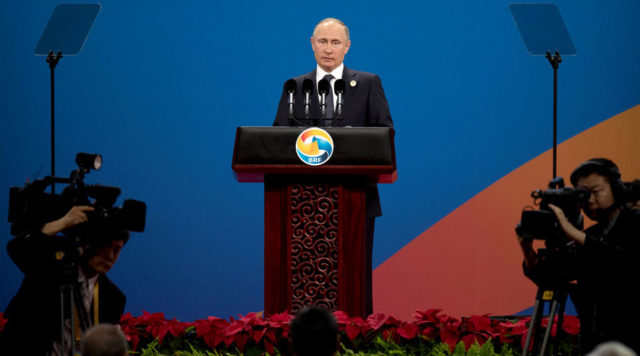
Russia’s Reservations About China’s Silk Road
Publication: Eurasia Daily Monitor Volume: 14 Issue: 67
By:

The One Belt, One Road summit, held in Beijing on May 14–15, was supposed to be a celebration of China’s major Eurasian developmental initiative (Xinhua, May 16). But at least to outsiders, it may not have turned out this way. European reservations hindered the acceptance of an agreed communiqué. And in the week before the summit, many Western articles demonstrated that China, despite promises of enormous investment, had in fact actually offered little to recipients. Meanwhile, India refused to attend (The Times of India, May 16). These facts made the appearance by Russian President Vladimir Putin at the summit all the more interesting.
In general, Russo-Chinese relations have become an analytic football, with numerous observers in the United States, Russia, Europe and China all trying to determine its precise extent and its economic dimensions. Putin’s statements in Beijing this week will not contribute to dispelling this conundrum. On the one hand, Putin, as he has habitually done, dismissed claims that Russia should fear China’s economic advances or that Beijing was turning Russia into a “resource appendage” to China. In his speech to the summit, the Russian leader announced his support in general terms for the Belt and Road Initiative (BRI), but also used the occasion to frame that support within his larger vision for giant Eurasian integration schemes from Lisbon to Vladivostok. Putin also invoked Russia’s traditional ambition for grand Asian projects, even though most of the projects that Moscow has touted as evidence of its interest in and aspirations for Asia were never completed. In other words, Putin tried, at least rhetorically, to shift the emphasis to Russia’s priorities regarding Eurasian and Asian integration programs and Russia’s developmental programs for the Arctic—which are increasingly tied to Asian energy and economic futures (Kremlin.ru, May 15; see EDM, April 7).
On the specific issue of major Eurasian integrationist projects, Putin’s support for China’s BRI was hedged and equivocal. In this respect, he reflected the observations of Carnegie Endowment scholar Alexander Gabuev that “Russia’s elites’ high expectations regarding Belt and Road have gone through a severe reality check, and now oligarchs and officials are skeptical about practical results” (The New York Times, May 13).
Hitherto, it appears that Russian analytical writings on China and the issues of Eurasian integration have been constrained to apologias for optimism and denials of problems in a vein reminiscent of Soviet Socialist Realism. Typifying the trend toward enforced official optimism, several Russian writers now argue that the BRI either is fundamentally different from Russia’s integration efforts in the former Soviet Union or that these two projects are complementary (International Organizations Research Journal, Vol. 11, No. 2, 2016). But the evidence suggests a third alternative, namely that China is utterly self-interested and relentlessly subordinating Russian interests to its own goals; furthermore, it seems to be driven by a more genuine market logic that respects economic realities.
In 2014, Chinese investors announced interest in investing in a high-speed Moscow–Kazan railway, which was to become the foundation of a rail line leading all the way to Beijing. Yet, while the original memorandum of understanding (MOU) envisaged the railroad passing through Siberia, later on it was revealed that the line would go instead from Astana, Kazakhstan’s capital, through Xinjiang, bypassing much of Russia and cutting travel time by two thirds. So much for a “model project of Russo-Chinese cooperation.” Indeed, a number of east–west transit corridor spurs for Sino-European trade bypass Russia altogether, going through Central Asia and the South Caucasus. But since maritime intercontinental trade remains vastly cheaper than overland trade, land routes account for less than 1 percent of total cargo between China and Europe (International Organizations Research Journal, Vol. 11, No. 2, 2016).
Thus, despite all the soaring rhetoric about the unprecedented and enormous scope of the BRI, it is clear that there are many unforeseen problems attending its birth and evolution. India did not participate in the Beijing summit, citing concerns about assuming excessive debt (and no doubt, geopolitical considerations also loomed large). Other, smaller countries, like the Central Asian republics cannot afford to resist these Chinese investments; but they undoubtedly share the same concerns, as these investments also often bring unwanted ethnic strife to their communities, and China clearly invests less than it promises. Russian observers, too, have come to discern this last problem. In advance of the summit, Kommersant published an article citing problems in financing these mammoth projects and the ensuing debt burden upon the receiving countries (Kommersant, May 12).
By the same token it seems clear that differences over economic issues have continued to remain an Achilles heel of the bilateral relationship with China. It has long been known that the energy relationship has been a troubled one, and Putin was at pains to announce that work on the Power of Siberia natural gas pipeline was moving forward (Kremlin.ru, May 15). But even if Russian sources claim that Russo-Chinese trade will reach $80 billion by 2018, that is unlikely to overcome the gaps—especially as China has just signed a trade deal with the United States, whose political significance is probably greater than its economic importance (RT, May 15). Ultimately it is the sorry state of Russia’s economy and infrastructure—i.e., the legacy of Putin’s misrule—that lies at the heart of Moscow’s inability to exploit its position in Eurasia for its own benefit, either in its own grand designs or China’s (Nezavisimaya Gazeta, November 24, 2016). And one should not expect Beijing either to rectify that failure or to refrain from exploiting it to its own advantage.



